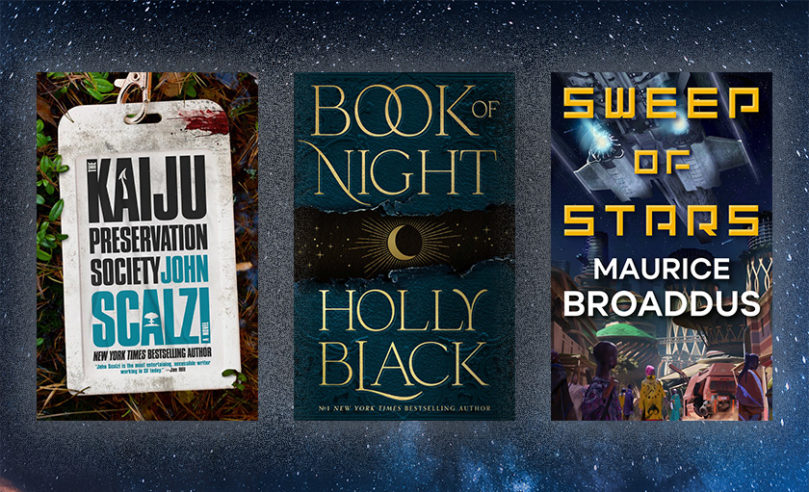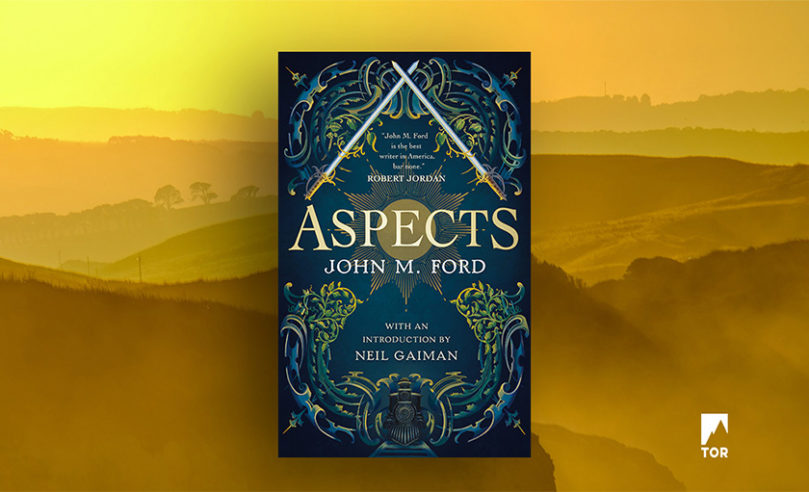opens in a new window opens in a new window
opens in a new window opens in a new window
opens in a new window opens in a new window
opens in a new window opens in a new window
opens in a new window
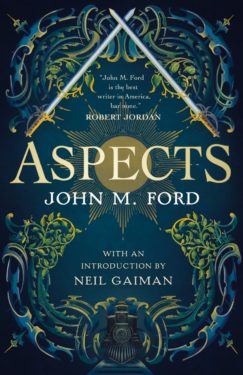 “The best writer in America, bar none.”—Robert Jordan
“The best writer in America, bar none.”—Robert Jordan
At last, the final work of John M. Ford—one of the greatest SF and fantasy authors of his time.
Enter the halls of Parliament with Varic, Coron of the Corvaric Coast.
Visit Strange House with the Archmage Birch.
Explore the mountains of Lady Longlight alongside the Palion Silvern, Sorcerer.
In the years before his unexpected death, John M. Ford wrote a novel of fantasy and magic unlike any other. Politics and abdicated kings, swords and sorcerous machine guns, divination and ancient empires—finally, Aspects is here.
“A great writer who is really fucking brilliant.”—Neil Gaiman
Please enjoy this free excerpt of opens in a new windowAspects by John M. Ford, on sale 04/05/22.
CHAPTER 1
The City and Solitude
It has been said that, if a person is going to die, he should do it in the morning: when the day is new and clean and full of unanswerable questions, when the sun has just risen to cast an afterglow on the things that have been done by night. It has also been said that, if a person is going to die, the circumstances are irrelevant.
On this Paleday morning in Lystourel, capital city of the Republic of Lescoray, the twenty-fifth day of Shepherd’s month, three days before the Equinoctial holiday and six until the autumn Equinox itself, a legal duel was scheduled for seven o’clock in the morning: by seven thirty at the latest, a man whose beliefs ran one way about death and morning was going to kill one of the other persuasion.
It was a foul morning anyway, cold a month too early, the wind off the Grand Estuary hard as a slap across the cheek. The sky was lumpy and curdled, and sooty as well, because the weather had forced fires lit before the flues had been properly cleaned: there was creosote in the air, there would be chimney fires tonight, and the price of dusted coal on the City Exchange was over two gold marks the wagonload for the first time in years.
The gilded dome of the Lystourel Cathedral looked dull and sullen as old copper; the copper dome of the National Gallery looked green and moldy; the glass sheds of the Grand Ironway Terminus were clouded, vapors thick beneath them, like infected blisters. It was the kind of day that made people in the streets long for a King over Lescoray, to heal the aerial sickness, blow away miasma with a royal word. None of the people in the streets was old enough to remember when Lescoray actually had a King over it, which made the longings perfect.
The time was now twelve minimi before seven, and the duel was organizing itself in Willowpark Square, in the western part of Lystourel, just south of the fashionable Silverthread District. The square was four rows of high houses, including the Consulate of a tiny island republic, facing on a small green plot surrounded by an iron fence. There were drooping willow trees, just turning yellow, miscellaneous bushes and benches, a neglected rose arbor. On the outside of the fence were the uninvited spectators: some coatless boys with schoolbooks, some curious tradesmen. The residents were discreetly in their upstairs windows. Inside the fence was the crowd for the matter at hand.
It took rather a lot of people to conduct a legal duel. There were the two duelists’ seconds, young women with their hair tucked under their tall hats and long winter capes over their morning coats; one was in blue, one in green. They were looking rather sadly at one another, but did not speak. The one in the blue coat carried a long, narrow leather case and had a black cheroot between her teeth, chewing more than smoking it. The dueling proctor wore a dark green belted coat, with a silver chain of office crookedly over his shoulders, and a white weeper tied around his silk hat. It fluttered dismally in the wet wind. He tapped an ivory-hilted cane on the ground, looking bored, or impatient, or both. At his side was a boy in a jacket and cap, with a badge pinned to his chest and a wooden box under his arm.
Behind the proctor was a bailiff in the uniform red-andsilver livery, silver buttons on his jacket and black leather cap and boots, silver rope over one shoulder balancing the sling of the magazine carbine on the other. Everyone looked with distaste at the bailiff’s rifle, and the bailiff returned the looks in kind.
A little distance away, leaning against a tree, was the surgeon, in a wine-red, swallow-tailed morning coat and crimson cravat, a white fur hat rakishly on her head. Dangling from her waistcoat pocket was a golden sunburst watch fob, indicating that she was also an accredited sorcerer. It had become fashionable for the observing magicians at affairs like this to fade into the background. The sorcerers’ guild had created the fashion, trying to discourage the idea that a sorcerer would help anyone cheat in the first place.
There were two reporters, rather less well dressed than the rest, one in a short wool coat, cotton cravat, and round-crowned hat, the other in a leather engine driver’s jacket and cap, a soiled silk scarf around his neck, and no cravat at all. One was from the Evening Observer, the one in the jacket from the Northern Star. The Star man would be hitching a ride on the next freight train home with his story as soon as the duel was over, saving the cost of magnostyle and the indignity of having his words rewritten at the office. He had a hip flask of whisky out and open, and was sharing it with his comrade of the press. This was not the usual duel, which they could write up beforehand and insert the names in the appropriate spots after; one of the parties was a Coron in Parliament, and if he died, it would be actual news, at least in the North where his Coronage was.
The duelists were the last to arrive, as was customary. One, a young cavalry officer named Chase, was crossing the square, whirling his cloak off as he shoved through the gate; he tossed the cloak to his second and stretched, his tied-back brown hair bouncing as he moved. The wind fluttered the linen ruffles of his white shirt.
The other man, the Coron Varic, took a step away from one of the willows. He was rather tall, dark haired, severely thin, in a steel-blue frock coat and gray trousers. He took off the coat, folding it lengthwise and over, and handed it to his second; he adjusted his braces slightly, loosened his dark blue cravat but did not remove it.
The breeze rose slightly, shaking the willow trees. The Goddess Coris, it was said, must have been in a terrible melancholy when She made willows. From a few blocks away, a tower clock began striking seven.
The dueling proctor said, “There is still time, honoreds, to conclude these differences without violence, or to lessen their extremity. I remind you both that the insult has been deemed mortal, yet lesser strokes have satisfied greater men. Will you accede?” The law required that the proctor say the words; it could not demand any feeling or concern in them.
Lieutenant Chase said, “The insult remains, honored: no pretense that it is less can make it any less. I do not accede.”
Varic nodded without speaking.
The proctor said, “Then I am required to remind you that the matter, being so begun, may only be so concluded.” He waved to his assistant. The boy held up the wooden case, and the proctor took from it a large, heavy pistol, an antique, firing a single shot with a cap and hand-tamped powder. There was no legal requirement that he use such a thing. “I am the instrument of conclusion,” he said, as prescribed.
The duelists looked at the proctor, then at each other. Varic said suddenly, “How many people have you killed, Lieutenant? I’ve killed two, under just these circumstances. A young man in Trumpeters’ Park, and a very pretty young woman by the Estuary. She was a cavalry lieutenant as well.”
Then I have more honor than my own to redeem,” Chase said.
“She’s dead,” Varic said, “and won’t ever notice.”
“You don’t begin to frighten me,” Chase said, thin patches showing in his voice. “I don’t care how red your lance may be.” He looked, expectantly, into Varic’s face.
The Coron’s expression did not change at all. “Frightening you was not my intention. I just thought you should know that this is an old business with me. I have no particular interest in killing you, Lieutenant.”
“Then you, honored, are at the disadvantage.” It was not a challenge, just a flat statement.
Varic said, “Just so. As the . . . injured party, you have choice of weapons.” He motioned toward his second, who rolled the cigar to a corner of her mouth and opened the long leather case. Four swords gleamed dully on velvet inside. “Sabers or rapiers, Lieutenant?” There was no mention of pistols. They were all gentlefolk here, except possibly for the reporters, and the well aspected did not shoot one another over honorable disputes. The proctor’s gun was another business entirely.
Chase inspected the swords. “These are excellent weapons, Coron.” Varic nodded meaninglessly. “Rapiers, then,” Chase said, and selected a sword, with a straight thin blade and a plain cross hilt, not ornamented at all. Chase tested the sword’s balance, then stepped back as Varic took out the matching weapon.
Varic said to his second, “If it goes against, you’re to report directly to Brook.” The woman nodded, closed the case, dropped the stub of her cigar, and ground it under her boot.
The proctor held up his cane. Varic and Chase took up positions to either side, crossing their points above the stick.
The cane fell. The swords, the duelists, the whole square held still in the cold, bad air for a few instanti, half a heartbeat, and then steel flashed down like a thunderclap.
They stayed close for the first minima or so, Lieutenant Chase parrying brilliantly, thrusting very near his opponent, stepping lightly from side to side. Varic stood nearly still, moving his blade in simple straight lines, easy for the eye to follow, for the hand to predict. Click, ring, step, scrape, the two of them matching moves as if this were an open-air production of King Zargo. Wherever Varic put his sword, Chase’s blade was there first.
And then, suddenly, it was not. The very tip of Varic’s sword was in the meat of Chase’s upper left arm, and there was blood on the white linen. Varic pulled out, held his sword at high guard. Chase did the same. They fell to again, both walking now, stepping off the narrow garden path as they circled one another, steel whipping across the space between. The lieutenant was not content to fence now, he was fighting, trying to find an opening in his enemy’s guard, cut a way into Varic’s flesh. He leaped to the top of a stone bench, slashed, leaped down again.
Varic recoiled, executed a circular disengaging parry, seemed to stumble. Chase lunged into the gap, with a perfect deadly geometry. Steel cut air, whistling.
And then there was a sharp, bright note as Chase’s rapier hit the pavement. There was a gash the width of his right arm, a sheet of blood running from it. Varic was standing entirely away from Chase; if not for the blood dripping from his sword, he might have had nothing at all to do with the wound.
Chase looked at Varic, at Varic’s sword, at his own on the ground. He took an uncertain step, his boot squeaking in his own blood. Varic simply waited.
The lieutenant turned and ran.
The dueling proctor leveled his pistol at the fleeing man’s back. Varic took a long step, and his sword flicked out, knocking the barrel of the gun upward even as it snapped and fired; the bullet rustled the boughs of a willow, and there was an explosion of sparrows.
“Your pardon, honored,” Varic said softly. “I’ve spoiled your aim.”
“No matter,” the proctor said, examining his pistol for damage. “I believe the affair is now concluded?”
“To my satisfaction, certainly.”
“Indeed.” The proctor’s assistant held out the gun case; the proctor put away the weapon, adjusted his cloak and white-sashed hat. “You will of course excuse me, ladies, gentlemen. I have another of these matters to attend at eight. Find Goddess in your ways.”
“In your way,” the others said—though Varic only nodded, and the leather-jacketed reporter was already running to find his train—and the proctor left Willowpark Square, his assistant and the bailiff following behind him. The surgeon stood still for a moment more, then tipped her hat and departed after them.
Varic was sitting on a park bench, cleaning the sword blades with a lemon and a cloth. Lieutenant Chase’s second said to him, “Well and fairly done, honored.” Her face was a bit flushed, perhaps with the cold. Varic said, “Thank you,” and the woman went away.
The Observer man came up, his notebook and fountain pen out. “That was quite a fight, milord, quite a fight. Tell me, Coron, were you ever in the army?”
“No,” Varic said, wiping a rapier and replacing it in the case. “I’ve spent most of my career in Parliament.” He looked at the reporter, smiled faintly. “That’s a sort of fencing practice, you know.”
It took the man a moment to get the joke. Then he laughed, said, “Oh, yes! Very good, milord, very good indeed. Thank you.” He scribbled in his book and departed.
Varic’s second had lit a fresh cigar. She said, “Why did you say that, milord Varic?”
Varic put the other sword away, closed the case. The woman was only an acquaintance of his, a retired foot soldier; Brook had suggested her for this morning’s duty. “Because he’s a reporter,” Varic said pleasantly, “and he wanted something to report. I gave him a line he can use, and now he won’t have to make something up.” He sat back, feeling the sweat on his shirt go cold, and looked at the park fence: the spectators, perhaps twenty of them, were starting to drift away from the iron bars. A small blond boy kept staring. Varic gave him a small salute, and the boy turned and ran away. “What’s the time?”
The woman checked her pocket watch. “Twenty-five past seven.”
“Ninety-five minimi to the session bell. . . . Best see if you can find a cab for me. And, Rose?”
“Milord Coron?”
“If I ever have to do this again, I’d be pleased to have you as second. But I hope we never have to.”
“Of course, honored,” she said, sounding somewhat puzzled.
Varic thought, though there was no way to explain it to Rose, that this probably would be his last duel. Those responsible had now failed three times; time to try something new.
Rose had probably been in duels, at least seconded often, since Brook had recommended her. But she was a soldier of Lescoray and therefore had no personal experience of war.
She hailed a two-wheeler with military authority. Carrying his coat over his arm, Varic thanked her again; she would take the swords back to Varic’s house in Healstone Court. After that, barring a fourth duel, they would meet only at sociable functions, Infantry Balls, and charity teas. They would smile at one another, and say, “Yes, we’ve met,” sharing the secret: and let the world confound itself trying to guess at it.
“Parliament House,” Varic told the cab driver as he stepped aboard. He sat down, added through the trapdoor, “West entrance.” The driver nodded, snapped his whip once smartly, and they were off through the gray and hazy streets.
They turned south, out of the residence blocks, and soon were in the heavy morning traffic along the Fresh, the smaller river that branched to the west from the Grand. A bit of Varic’s mind registered the route, making sure the cabby stayed direct, while his main thoughts ticked over the schedule of motions before the Lords today. There were seven on the calendar. Things had piled up, as they always did before a recess. It had the small advantage of shortening the debates.
Four days to the Equinox, he thought. Four days and he would be forty marches away from the City, a guest at Strange House surrounded by friends and fellow guests, a long way from Parliaments and political duels and polluted air. They would play games and argue philosophy and take tea in the autumn twilight—and Varic would spend the whole time with one ear listening for the click of the magnostyle, and when finally the train brought him back to the Grand Terminus, he would feel an inexplicable relief.
The cab turned right, crossing the Fresh on the New Castle Bridge, an ironwork only a few years old; its bright green paint was beginning to turn dingy, and Varic supposed that next spring there would be a motion to repaint it. He filed a thought to check the price for red lead. Just to the right was the Old Bridge, now closed to all but foot traffic. On it, people were strolling or admiring the view, poor as it was today. A coal barge was passing under the central stone arch. The arches were sound after five hundred years. The pilings had been laid by the Quercians, six centuries earlier still. Varic wondered if the New Bridge would be anything more than rust in a century. Even with the red lead.
He looked out the left-side window. Receding behind them, on the point of land where the Fresh branched from the Grand River, was the Castle, a confused but certainly impressive jumble of towers, subfortresses, arches, and buttresses, ringed by the remnants of three different wall systems. Its foundations were Quercian, too, as was the innermost wall. Every ruler since the Empire departed had considered it a personal duty to build something onto the Castle, and usually to tear something else down. Quercia was like that: dismantled, overbuilt, plowed up, quarried, exploded, still the Luminous Empire ended up under your feet, in the walls around you.
The cab reached the South Corner, a fringe of parkland and middle-cost houses around the water, holding back the sprawl of industries farther south. They turned smartly east around Greengage Circle and crossed the Grand River on a stone-andiron bridge high enough to pass a sloop’s topmast. The haze was lifting a bit, and away to the south a forest of masts and rigging was just visible, lining the Estuary. The road came down again into the measured and formal street grid of the East Bank.
Measured and formal when it was laid out, at least. Now the streets were full of flower carts, beer wagons, two-wheel cabs, and four-wheel coaches—Varic heard his driver snort, and saw where some idiot had tried to take a four-horse rig down a side street, blocking it hopelessly—vendors of groundnuts and fresh fish and sausage rolls and eel pies, jaunty signboard-men and tired prostitutes, doctors on rounds and fiddlers playing for copper aces, dawn-service priests tipping their hats to highdayservice priests, those who had worked all night passing those who would work all day passing those who were too wealthy to work at all and were exhausted with their efforts. The streets smelled of starch and urine, mountain flowers and fried pork and cheap beer; they sounded of trade calls and children’s verses, outraged horses and human pain. They were all walled in with many-windowed building fronts, roofed over with coal smoke and magnostyle wires, and packed so solid you could cut slices from the mass.
How could human beings live in this place, Varic thought; how could anyone feel entirely alive until he had lived here?
The streets broadened. Trees appeared, and geometric plots of grass, unbelievably green against the gray City. The cab passed the Park of the Clarity Kings, still hung with fog that made its monuments look sepulchral. To the other side, fronting on Vineyard Avenue (where the last live grape had grown six hundred years ago; now there were iron vines climbing the streetlamps) was Parliament House, twenty columns on its south face, forty broad marble steps down to the avenue. When there was sun, it was very white, and quite beautiful.
The cab passed it by, as instructed, and stopped at the western side, where there was a small walled courtyard and a modest door.
“Fare?” Varic said, gathering his coat and his thoughts.
“Three plates four, honored.”
Varic gave him four silver plates, said, “No change.” The cabby saluted with his whip and drove on. Varic went through the garden, which was empty, pulled the bell cord at the door. The porter admitted him, with only a slight off glance at his shirt and undone cravat. The foyer within was simply decorated, the walls painted a cool pastel green meant to be soothing to redrimmed eyes. The glass-cased clock showed six minima to eight. He should have given the cabby a larger tip, Varic thought, or at least taken his license number. He went two floors up the oak stairway, to the floor of offices one below his own. From behind the other doors along the corridor there were small sounds, of teacups rattling, newspapers rustling, the crunch of toasted muffins.
He knocked on a door. “Yes,” came the answer. Varic went in.
The Chief Parliamentarian’s office was large, three ordinary members’ offices combined, but crowded. The walls of the front room were completely covered with plaques, scrolls, awards, an enormous globe standing next to an enormous desk. The library was visible through a door at the rear, and the door to the conference room. They had spent a lot of time in the conference room, around the green table, taking apart Lescoray’s wheezing patchwork Constitution like surgeons over a dying patient, trying to stitch together something that would heal, be strong, stand on its own. Surgeons, of course, could summon, or themselves be, sorcerers, thought-work a raddled blood stew back into organs and whole bones. Laws and articles broke more easily and mended harder.
Brook was sitting on a green plush davenport by the window, in the pale north light, reading a book. A cart with the remnants of a breakfast and all the morning papers stood a little way from him.
Brook’s hair was gray with a touch of silver, swept immaculately from his high forehead and temples; he had long and feathery mustaches and a neatly pointed beard. Steel-rimmed reading glasses sat low on his broad nose. His morning coat was of a gray just less than black, his trousers dove gray. A linen napkin rested on one knee, and half a buttered muffin on the napkin.
He closed the book and considered the muffin. “You look like you’ve spent the evening in a joy house.”
“It would have been pleasanter,” Varic said.
“So you killed the lieutenant?”
“No. I cut him, and he ran.”
“Then the proctor . . .”
“Missed. I must change my shirt.”
“There’s time. Have some tea. And one of those.” He ate some more of his own muffin.
Varic looked at the breakfast service and was instantly hungry; he had drunk a cup of strong black tea before the fight, but that was all. He poured tea, not commenting that there was a second clean cup, and lifted a silver cover. There were two kippers underneath it. Brook hated kippers. But he knew about duels; he had fought his share once.
Brook said, “You never told me why this young man wanted so particularly to kill you.”
The salt fish stung Varic’s mouth; he swallowed some tea, said, “The speech I gave on the eighteenth, about the value of cavalry. Civilian idler impugning the honor of the service, and so on.”
“Ah. Of course. Honor of the service.”
Varic raised an eyebrow. Surely Brook didn’t believe that.
Brook said, “Your friend Winterhill brought me a copy of a letter last night, concerning Lieutenant Chase and a large gambling debt. Honor of the service, you know.” He looked over his glasses at Varic. “I’d ask you how Winterhill comes by such things, but I’m afraid you’d tell me.”
“Just as well Chase is a cavalryman,” Varic said. “I doubt he’d ever seen so much blood in one place before. If he’d been a real fencer, like the others, I’d have had to kill him.”
Brook said, “I have not known many souls who could keep weighing the need to kill a man after the swordplay had begun.” He finished the muffin, put the book aside, stood up. Brook was a large man, taller than Varic and half again as broad. “And I know this is useless, but you might be more careful in public speaking of the Lescorial Forces of Defense.”
“I’ve shown you the papers on Sarmanjai; you were there when I spoke,” Varic said. “The Imperial Horse were the equal of anyone’s—certainly ours, who haven’t seen a fight in ninety years—and in one charge against a rather ordinary bunch of emplaced riflemen, they lost seven in ten dead and the rest too badly hit to reach the enemy.” He put his cup down. “It’s nothing to do with bravery. War isn’t, not these days. I can’t help it if the word hasn’t reached here.”
“Well, hurrah for peace,” Brook said quietly.
Varic paused and chuckled.
Brook said, “So your humor lived through it as well. Good. Good.”
Varic said, “I don’t suppose the gambling letter mentions any interesting names.”
“No. Did you expect it to?”
“Chase made a joke about ‘reddening my lance.’ I don’t think it was original with him.”
“Ah,” Brook said thoughtfully. Two centuries earlier, when the Parliament was new, the Coron Redlance had been the driving wheel within it. Brook was occasionally called the second Redlance, a title he detested. Whoever had bought Lieutenant Chase’s debts had probably given him the comment to deliver as well. But of course there was nothing provable in that, and Brook said so.
Then he said, “Speaking of the letter, Winterhill brought it to me because you were out last night. Were you in Cold Street?”
“No. I was at home. But I’d sent Midden home early, and I must not have heard the bell.”
“Winterhill thought you’d gone to Cold Street.”
“Winterhill has a fascination with Cold Street. Something to do with his name, I imagine.”
“When were you there last?”
“Some weeks, I think.”
Brook said, “Some months, I think.”
As you say. I must change my shirt before the session.”
“They ask about you. They like you, Varic.”
“I pay my bills on time.”
“I said,” Brook said, very softly and firmly, “they like you.”
“I’m pleased. I haven’t felt the need.”
“Congratulations.”
“Brook, as you very well know, we’ve had six major votes in that time, a seventh today, and another in three weeks. Are you suggesting that my intimate activities are an essential part of our strategy?” He smiled again. “If you are, I shan’t disagree, of course.”
“We are a long way from completing the Revision,” Brook said. “We have a battle today, and then a hundred more, small and great. And you will be no use at all if you’re so intent on the battles that you forget to breathe.”
“One doesn’t go to Cold Street to breathe. At least, I don’t.”
Brook said, “You are going to Strange House for the Equinoctial?”
“Certainly. My train is tomorrow.”
“Very well.” He sorted papers on his desk. “And you’d better get to your office. You really do need a clean shirt.”
Varic went out and up a flight to his own floor. They had not spoken of the day’s schedule. It was not necessary.
He went into his office: one room with a large closet and a lavatory alcove. He rang for the porter, pulled off his cravat and shirt, poured water into the basin, and began washing up, untying, smoothing, and retying his hair at the back, pausing to soak his eyes. He took a fresh white shirt from the closet drawer, had it on but unbuttoned when the knock came.
Leyva, the third-floor day porter (since the Quercians, the saying went), was there with her brass cart and her long white coat. She didn’t even blink to see him with his braces down and his undershirt showing. “Good day, milord.”
“Good morning, Leyva.” He handed her the used shirt. “Wash and light starch, please?” One could get meals here, washing and mending, have a bed rolled in, bathe or shower down the hall. The office wing was everything a hotel was, except comfortable.
“Of course, milord.”
There was a firm click of heels from down the hall. “Porter, what’s the time?” a woman’s voice said. “How long until the Assembly?” The voice had a touch of Western throatiness. It was vaguely familiar.
Varic leaned out the door. The woman was wearing a black velvet tunic brocaded with silver, a sword-and-sunset emblem on the left breast, riding trousers tucked into boots. There was early white in her black hair, which was held back with a silver mesh band. The costume was only, Varic guessed, a hundred and twenty years behind City fashion. Her face was a bit flat, her nose a bit broken, but quite pleasing, he thought. “Nine minimi,” he said. “There’s a single bell at three before. Plenty of time to reach the Chamber.”
She looked hard at him, at his open shirt, then said, “Thank you.”
“Of course. You’re Lady Longlight, correct? From the Far West.”
“I’m glad to see someone here knows me.”
“Now, you’ll hurt Leyva’s feelings,” Varic said, buttoning up. “I’m sure she recalls you.”
The porter said, “The lady Coron was last here on the tenth day of the Spear, just after the last Evenday. She had number 319 then, as well, and salt beef and eggs for breakfast, as she did this morning.” Leyva smiled fit to break one’s heart.
“You see,” Varic said, “The Coron of the Third Floor remembers you very well. You’re here with a private motion, I believe. Number seven on the calendar.”
Longlight said coolly, “I’m here with the same motion you’ve ignored five times now, thank you very much.”
That turned the page in Varic’s memory. “Longlight, daughter of the Palion Chesdonay, Coron of the Great Rogue Hills. You have an outlaw problem.”
“Ay—yes,” she said, startled. Far Western dialect, yes, Varic thought. She said, “And you are—”
“Varic, Coron of Corvaric.” He bowed slightly as he fastened his cuffs. He was weighing the situation. She had inherited the Coronage three years ago. The Assembly had voted down her motion for assistance against the outlaws five times since then. There was no more support for it today. And he had Motion Five to deal with.
Longlight said, not too harshly, “If you know I have a problem, do you propose to do anything about it?”
Copyright © John M. Ford 2022
Pre-order Aspects Here:
opens in a new window opens in a new window
opens in a new window opens in a new window
opens in a new window opens in a new window
opens in a new window opens in a new window
opens in a new window
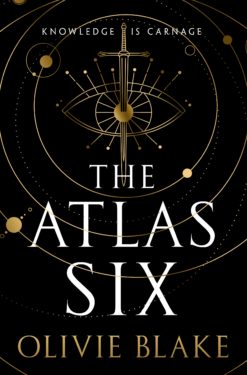 The Atlas Six by Olivie Blake
The Atlas Six by Olivie Blake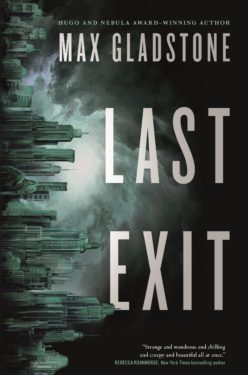 Last Exit by Max Gladstone
Last Exit by Max Gladstone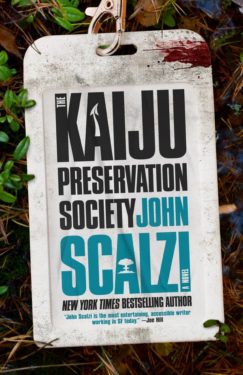 The Kaiju Preservation Society by John Scalzi
The Kaiju Preservation Society by John Scalzi Worlds of Exile and Illusion by Ursula K. Le Guin, introduction by Amal El-Mohtar
Worlds of Exile and Illusion by Ursula K. Le Guin, introduction by Amal El-Mohtar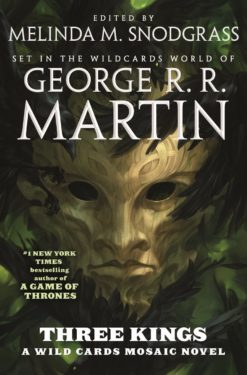 Three Kings edited by Melinda M. Snodgrass, in the Wildcards World of George R.R. Martin
Three Kings edited by Melinda M. Snodgrass, in the Wildcards World of George R.R. Martin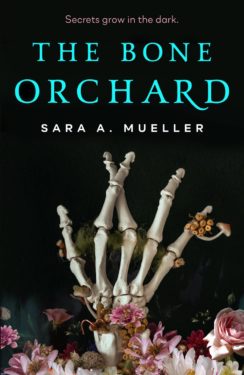 The Bone Orchard by Sara A. Mueller
The Bone Orchard by Sara A. Mueller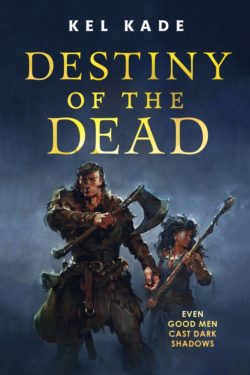 Destiny of the Dead by Kel Kade
Destiny of the Dead by Kel Kade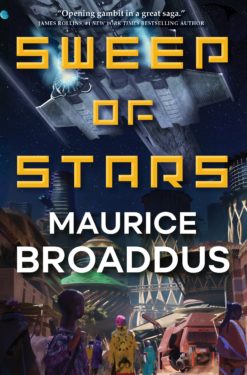 Sweep of Stars by Maurice Broaddus
Sweep of Stars by Maurice Broaddus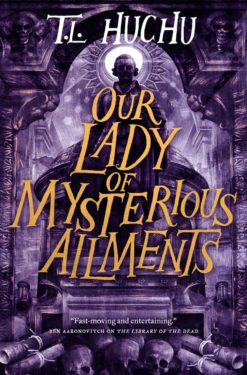 Our Lady of Mysterious Ailments by T.L. Huchu
Our Lady of Mysterious Ailments by T.L. Huchu Aspects by John M. Ford
Aspects by John M. Ford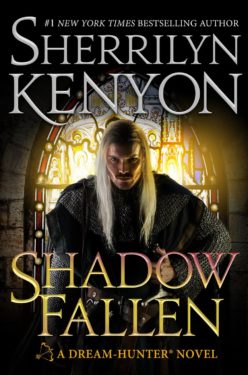 Shadow Fallen by Sherrilyn Kenyon
Shadow Fallen by Sherrilyn Kenyon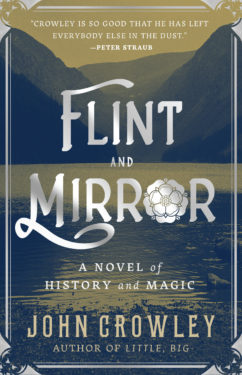 Flint and Mirror by John Crowley
Flint and Mirror by John Crowley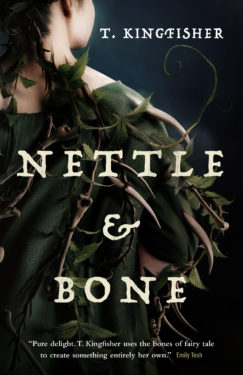 Nettle & Bone by T. Kingfisher
Nettle & Bone by T. Kingfisher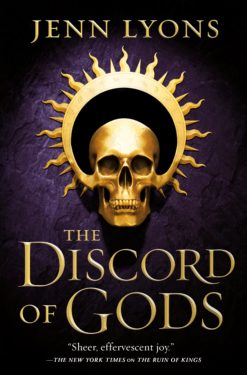 The Discord of Gods by Jenn Lyons
The Discord of Gods by Jenn Lyons Up Against It by Laura J. Mixon
Up Against It by Laura J. Mixon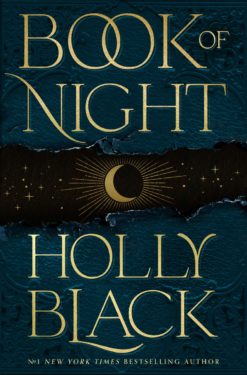 Book of Night by Holly Black
Book of Night by Holly Black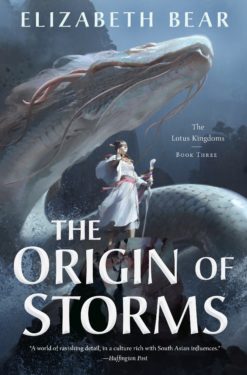 Origin of Storms by Elizabeth Bear
Origin of Storms by Elizabeth Bear
